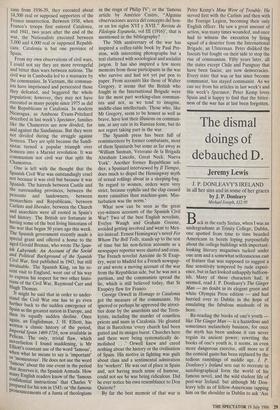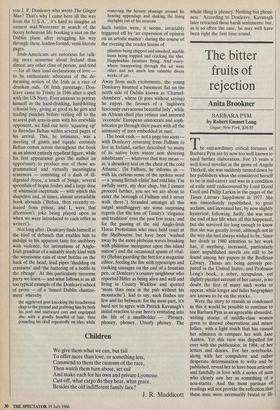The dismal doings of debauched D.
Jeremy Lewis
J. P. DONLEAVY'S IRELAND in all her sins and in some of her graces by J. P. Donleavy
Michael Joseph, £12.95
Back in the early Sixties, when I was an undergraduate at Trinity College, Dublin, one spotted from time to time bearded Americans in berets loping purposefully about the college buildings with important- looking literary magazines tucked under one arm and a somewhat selfconscious cast of feature that was supposed to suggest a fine sensitivity tempered by rude experi- ence, but in fact looked unhappily buffoon- ish. Many of these characters had, it seemed, read J. P. Donleavy's The Ginger Man — no doubt in its elegant green and white Olympia Press edition — and had hurried over to Dublin in the hope of emulating the fabulous misdeeds of its hero.
Re-reading the books of one's youth like The Ginger Man — is a hazardous and sometimes melancholy business, for once the myth has been undone it can never regain its ancient power; rewriting the books of one's youth is, it seems, an even more dangerous exercise, still more so if the comical gusto has been replaced by the tedious ramblings of middle age. J. P. Donleavy's Ireland sets out to recreate in autobiographical form the world of his famous novel, and the wild student life of post-war Ireland: but although Mr Don- leavy tells us of fellow-Americans tapping him on the shoulder in Dublin to ask 'Are you J. P. Donleavy who wrote The Ginger Man? That's why I came here all the way from the U.S.A.', it's hard to imagine an earnest mid-Westerner in search of the boozy bohemian life booking a seat on the Dublin plane after struggling his way through these leaden-footed, semi-literate pages.
Irish-Americans are notorious for talk- ing more nonsense about Ireland than almost any other class of person, and tend — for all their loud declarations of love to be enthusiastic advocates of the de- meaning notion of the Irish as a race of drunken oafs. Of Irish parentage, Don- leavy came to Trinity in 1946 after a spell with the US Navy. Ever anxious to portray himself as the hard-drinking, hard-hitting colonial boy, giving as good as he gets and trading punches before reeling off to the nearest pub arm-in-arm with his erstwhile opponent, we find our hero 'squaring up' to Brendan Behan within several pages of his arrival. This, he intimates, was a meeting of giants and equals: certainly Behan comes across throughout the book as an almost entirely repellent figure, while his first appearance gives the author an opportunity to produce one of those un- grammatical and virtually meaningless sentences — consisting of a dash of ill- digested Joyce, a touch of Synge, several spoonfuls of bogus Irishry and a large dose of whimsical ineptitude — with which this shapeless and, at times, almost unreadable book abounds (`Behan, then recently re- leased from prison, and I, were that afternoon's joke being played upon us when we were introduced to each other as writers').
Not long after, Donleavy finds himself at the kind of debauch that enables him to indulge in his apparent taste for snobbery with violence, for intimations of Anglo- Irish grandeur of a suitably seedy kind with the wearisome rain of stout bottles on the back of the head, lead pipes 'thudding on craniums' and 'the battering of a bottle in the ribcage'. At this particularly tiresome party we learn — and what follows is an all too typical example of the Donleavy school of prose — of a 'famed Dublin chastise- ment' whereby the aggrieved gent knocking the treacherous chap to the ground and grabbing him by both his port and starboard ears and engripped also with a goodly handful of hair, then pounding his skull repeatedly on tiles, while
removing the hirsute plumage around his hearing appendage and shaking the living daylights out of his neurons.
Such battles were, it seems, invariably triggered off by 'an expression of opinion on an artistic matter': during the course of the evening the reader learns of
pilasters being chipped and smashed, marble busts being toppled and cracking the tiles. Hepplewhite furniture flying. And every- where transporting through the air were other and not much less valuable divers works of art . . .
Away from such excitements, the young Donleavy haunted a basement flat on the north side of Dublin known as 'Charnel- chambers', where (it goes without saying) he enjoys the favours of a 'highborn lusciously curvaceous beautiful lady', while an African chief plus retinue and assorted `eccentric' European aristocrats and soph- isticates go through their paces with all the animosity of men embedded in suet.
The book ends — not a page too soon with Donleavy returning from Fulham to live in Ireland, earlier described 'to many of its native born winter non shivering inhabitants' — whatever that may mean as 'a shrunken teat on the chest of the cold Atlantic'. (In Fulham, he informs us with his curious sense of the spoken word — a 'young British elitist' had told him 'I'm awfully sorry, my dear chap, but I cannot proceed farther, you see we are about to enter the borough of Fulham and I never walk there.') Stranded amongst all this turgid windbaggery are some surprising regrets (for the loss of Trinity's 'elegance and tradition' over the past few years, and for the passing of the old Anglo-Irish Horse Protestants who once held court at the Shelboume but have been 'washed away by the more plebeian waves breaking with philistine inelegance upon this island nation') and the occasional spasm of vital- ity (Behan guarding the fort for a magazine editor, feeding the fire with typescripts and cooking sausages on the end of a fountain pen, or Donleavy's country neighbour who reported Hitler as being alive and well and living in County Wicklow and spotted `more than once in the pub without his moustache'). Sad to say, such flashes are few and far between: for the most part, it's hard not to agree with Patrick Kavanagh's initial reaction to our hero's venturing into the life of a smallholder — 'Phoney, phoney, phoney. Utterly phoney. The whole thing is phoney. Nothing but phoni- ness.' According to Donleavy, Kavanagh later retracted these harsh sentiments: but, as is so often the case, he may well have been right the first time round.



















































 Previous page
Previous page